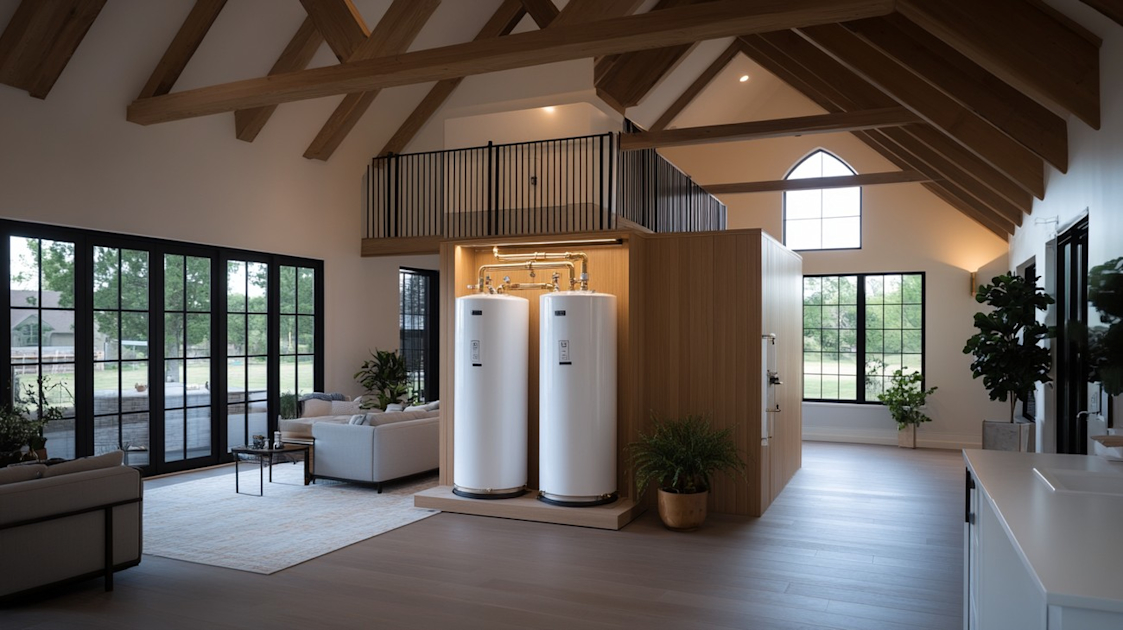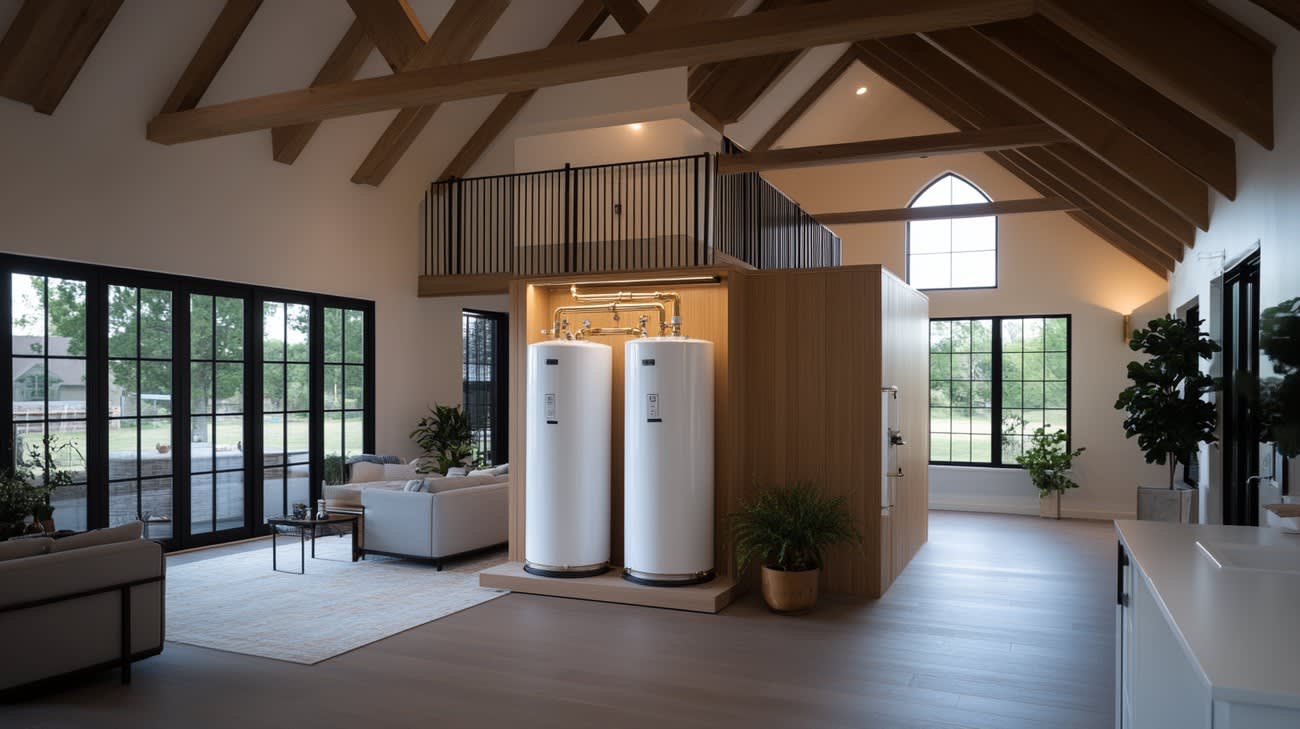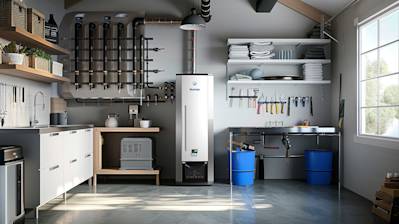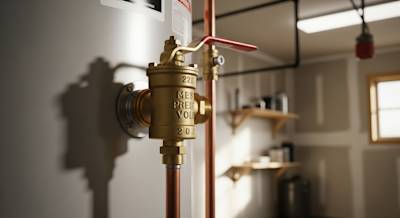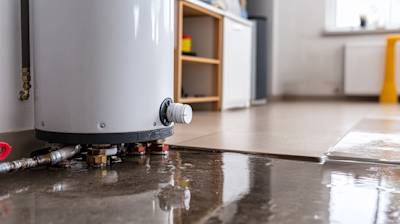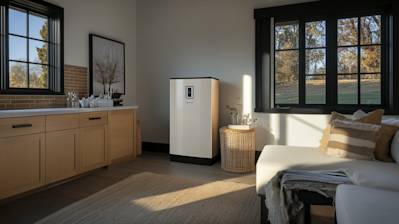Water heater expansion tanks are often overlooked, but they should be considered as one of the most crucial components within a household's plumbing system. Their primary function is to manage pressure changes in the water system, offering great protection for the water heater and the plumbing infrastructure. This insightful read will unpack the complexities and benefits of a water heater expansion tank, serving as a comprehensive guide for homeowners.
What exactly is a Water Heater Expansion Tank?
A water heater expansion tank, often known as a thermal expansion tank, serves as pressure relief for your house's hot water system. With the primary purpose of absorbing excess water pressure caused by thermal expansion, it safeguards your hot water heater from unnecessary strain.
When water is heated, it expands, increasing in volume – this is a fundamental concept known as thermal expansion. The pressure within your water heater increases as a result of this rise in volume. Here is where the role of the water heater expansion tank becomes crucial; it assists by absorbing the excess pressure, steering clear of potential leaks, ruptures, or damages to your plumbing system.
Types of Water Heater Expansion Tanks
There are varying types of water heater expansion tanks, and each of them serves a different need.
Diaphragm tanks: These are the most common type, and they work by using a rubber diaphragm to divide the tank into two sections - one filled with water and the other with air.
Bladder tanks: They function similarly to diaphragm tanks, but instead of a diaphragm, a bladder is used. These tanks offer more durability.
Closed tanks: As the name suggests, these tanks are closed off from the water heater system and use sensors to determine when pressure increases.
Choose the type that best fits your needs, and make sure to consult with a professional for advice.
Key Signs that Indicate You Need a Water Heater Expansion Tank
If your house is experiencing any of the following issues, a water heater expansion tank could be a possible solution:
- Your Temperature and Pressure Relief Valve is leaking.
- There are noticeable pressure fluctuations in your hot water.
- You notice the water heater makes a loud noise while heating.
Installation of Water Heater Expansion Tanks
Installing a water heater expansion tank may seem like a daunting task, but it is worth the investment. Not only does it enhance the longevity of your water heater, but it also prevents unforeseeable damages due to thermal expansion.
Keep in mind though, that the installation process requires a bit of technical knowledge. Therefore, consider hiring professionals who can efficiently carry out this task for you.
Maintaining Your Water Heater Expansion Tank
Maintenance is vital for increasing the lifespan of your water heater expansion tank.
Pressure Check: Check the pressure twice a year, and ensure it matches the house's water pressure.
Inspection: Look out for any corrosion or leaks. Call a professional plumber if you notice these signs.
Replacement: It's often better to replace the tank every 6-10 years, depending on your water usage.
The Value of a Water Heater Expansion Tank
Water heater expansion tanks provide priceless value to your home. They primarily protect your water heater and plumbing system from damage, saving you substantial costs for repairs or replacements. Moreover, by maintaining a harmonious equilibrium in your water system, they ensure a much smoother operation with minimal disruption.
Overall, understanding the intricacies of water heater expansion tanks empowers homeowners, allowing them to make informed decisions. Ensure the safety and efficiency of your home by considering the installation of a water heater expansion tank.
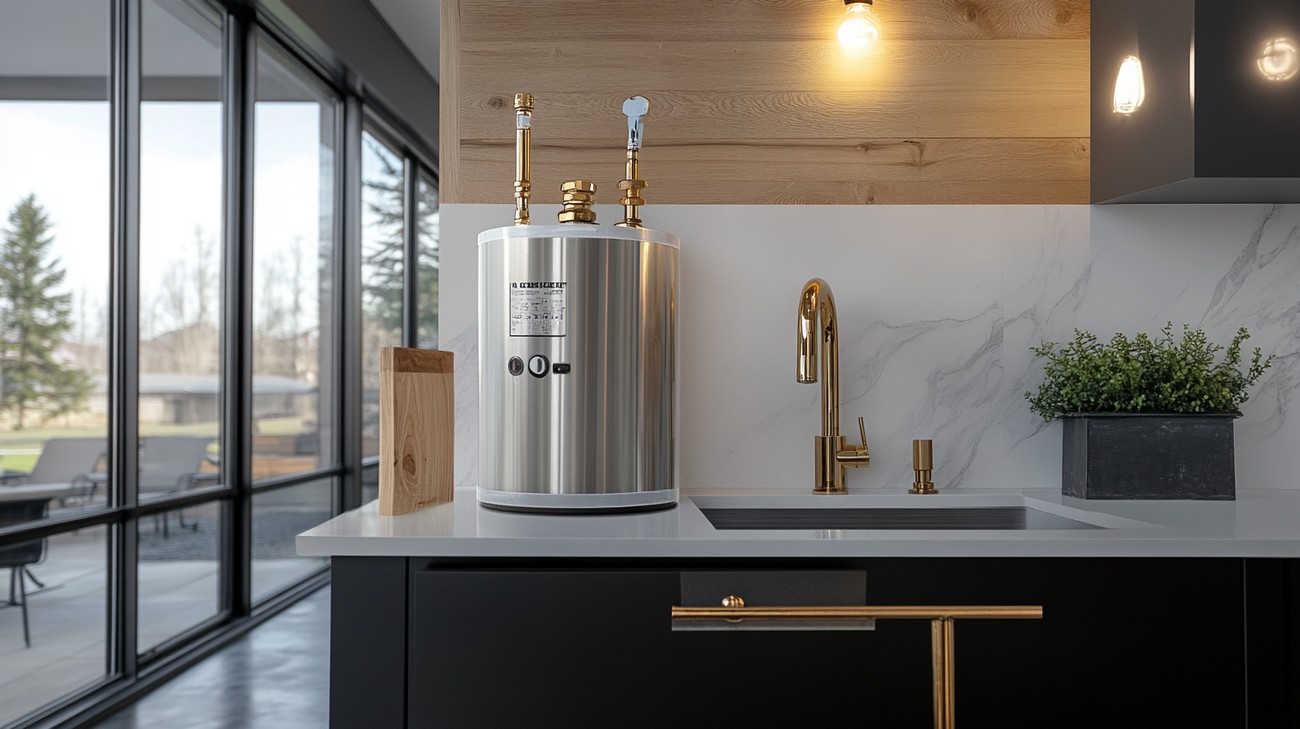
Frequently Asked Questions about Water Heater Expansion Tank
How Does A Water Heater Expansion Tank Work?
The expansion tank is a small tank that is installed in the water line that feeds into your water heater. It is divided into two sections by a diaphragm or bladder. One side is connected to the water line, while the other side is filled with air. When the water thermally expands, the excess water flows into the expansion tank, causing the air pressure to rise. As the water cools and contracts, it returns to the water heater, and the air pressure in the expansion tank drops back down. This cycle can continue indefinitely, keeping the pressure in your water heater manageable.
How Do I Know If My Water Heater Needs An Expansion Tank?
If you have a closed plumbing system, you definitely need an expansion tank to protect against increases in water pressure. But even if you don't have a closed system, local building codes may require one. Additionally, if you notice signs of high water pressure, like leaking faucets or running toilets, it may be a good idea to install a water heater expansion tank.
Can I Install A Water Heater Expansion Tank Myself?
While it is possible to install a water heater expansion tank yourself, it's generally recommended that you hire a professional plumber. The job requires a fair amount of expertise, as well as specific tools and materials. A professional plumber can also ensure that the tank is installed according to local building codes.
Where Should The Expansion Tank Be Installed?
The expansion tank should be installed on the cold water line that feeds into your water heater. The ideal position is to hang it off the ground and above the water heater if possible. This way, the expansion tank won't take up floor space and the cold water will have a direct pathway to the tank.
What Size Expansion Tank Do I Need For My Water Heater?
The size of the water heater expansion tank you need depends on the capacity and pressure of your water heater. In general, for a 50-gallon water heater with a pressure of 60 psi, a 2-gallon expansion tank is sufficient. It's always wise to refer to the manufacturer's instructions or consult with a professional plumber to determine the appropriate size.
How Often Should I Replace My Water Heater Expansion Tank?
The lifespan of a water heater expansion tank can vary greatly, depending on factors such as the quality of the tank, the quality of your water, and how often your water heater is used. As a general rule of thumb, it's a good idea to have your expansion tank inspected every 3-5 years. If the expansion tank is properly maintained, it can last up to 10 years or more.
How Do I Maintain My Water Heater Expansion Tank?
To maintain your water heater expansion tank, you can occasionally check the air pressure using a pressure gauge. The pressure should match the water pressure in your pipes. If the pressure is too low, it can be adjusted by adding air to the tank. If you're uncomfortable doing this yourself, a professional plumber can do it for you. Additionally, you should also inspect the tank regularly for leaks or corrosion, and have an annual inspection carried out by a professional.
Can A Water Heater Work Without An Expansion Tank?
In theory, yes. However, without an expansion tank to absorb the increased water volume when it gets heated, the pressure in the water heater and your plumbing system could increase dramatically. This can lead to damaging your water heater, plumbing fixtures, and pipes. It may also void the warranty of your water heater. Therefore, it's highly encouraged to use an expansion tank with your water heater.

Pros of a Water Heater Expansion Tank
Extended Lifespan of Water Heater
Improved Performance and Lesser Stress
Frequently, the water pressure on the main water heater exceeds its capacity, resulting in inefficient operation or even potential damage to the heater and its components. The expansion tank acts as a buffer, absorbing this excess pressure and reducing the overall stress on the main heater. With less frequent cycles of stress, the water heater's lifespan is naturally extended.
Fewer Leaks and Corrosion
High pressure within the water heater may lead to leaks, which could further promote the build-up of minerals, scales, and other deposits that eventually cause corrosion. By maintaining a more favorable pressure balance, a water heater expansion tank can effectively reduce the likelihood of leaks and corrosion, thereby further boosting the heater’s lifespan.
Safety Measures and Prevention of Backflow
Offers a Safety Valve
When the level of water pressure becomes too high, the water heater could potentially burst. In such scenarios, an expansion tank offers an additional safety measure by channeling excess pressure away and reducing the risk of catastrophic failures.
Prevention of Thermal Expansion Damage
An expansion tank helps in controlling the damage caused due to thermal expansions by providing an avenue for excess hot water to go into. This prevents hot water from flowing back into the main supply line, thus reducing the risk of damage to pipes, joints, and seals.
Reduced Energy and Maintenance Costs
Energy Saving
The expansion tank's ability to handle excess pressure directly correlates to less energy consumed by the heater for heating water, thus signaling a reduction in energy costs.
Lower Maintenance and Repair Costs
With less stress on the water heater, the frequency of maintenance and repair costs can be arguably reduced, thereby offering potential savings in the long run.
Cons of a Water Heater Expansion Tank
Installation Costs and Space Requirement
Additional Expenses
The installation of an expansion tank results in additional expenses. These costs include the purchase of the tank itself, installation fees, and potentially even the hiring of a professional plumber.
Space Limitations
Expansion tanks may also require substantial space for installation which might not be feasible for smaller properties or constructions. It's crucial to consider the amount of available space before installing an expansion tank.
Potential for Waterlogged Tank
Over time, the bladder within the expansion tank may start to fail and the tank could become waterlogged, losing its ability to control pressure effectively. This may lead to needs for frequent checking, repairs, or even replacement.
Inefficient for Large Scale Use
While expansion tanks work well for domestic use, they are often deemed inefficient for large scale or commercial use due to their size and capacity limitations.
Limited Durability
Even with the relief in pressure they bring to the main water heating system, expansion tanks have their own set of maintenance issues and do not last forever. Depending upon the model, brand, and the quality of water, an expansion tank typically requires replacement every 5 to 10 years.

Myths and Misconceptions About Water Heater Expansion Tanks
Water heater expansion tanks, small containers that help manage the increase in water volume in the water heater when it's heated, have been widely misunderstood over the years. Like anything else associated with technical systems, a fair share of myths and misconceptions surround expansion tanks. Below are some of these misconceptions clarified;
Myth 1: Any Expansion Tank Will Work
Fact: Specific Tanks Are Made for Specific Systems
Many people believe they can install just any expansion tank, with a one-size-fits-all mentality. However, this is certainly not the case. It's vital to know that expansion tanks are designed to handle certain capacities and pressures, even though they may all look similar. Be sure your expansion tank matches the size and the pressure needs of your water heater.
Myth 2: I Don't Need an Expansion Tank if I Have a PRV (Pressure Relief Valve)
Fact: A PRV and an Expansion Tank Serve Different Purposes
Another common misconception is the unnecessary installation of an expansion tank if the water heater already has a Pressure Relief Valve (PRV). While it's true that a PRV relieves excess pressure in the water heater, it doesn't necessarily accommodate for thermal expansion. An expansion tank, on the other hand, is designed to accommodate this increased volume of water when it's heated.
Myth 3: Expansion Tanks Don't Require Maintenance
Fact: Regular Maintenance Can Prolong the Life of Your Expansion Tank
There's a surprising belief that once you install an expansion tank, you can forget about it. Like any part of your plumbing or heating systems, regular maintenance ensures optimal performance and prolongs the lifespan of the equipment. Expansion tanks should be serviced annually as a part of routine water heater maintenance.
Myth 4: Expansion Tanks Only Work With Certain Types of Water Heaters
Fact: Expansion Tanks Can Be Used Regardless of Your Water Heater Type
Many people mistakenly believe that expansion tanks are only useful with certain types of water heaters. This is not true. Whether you have a tankless water heater, a traditional water heater, or even a hybrid type, an expansion tank could be beneficial. It's designed to manage increased water volume, regardless of the type of water heater you use.
Myth 5: Expansion Tanks Are Expensive And Unnecessary
Fact: Expansion Tanks Are a Cost-Effective Preventative Measure
The perceived high cost of expansion tanks often makes homeowners reluctant to install them in their homes. However, while an expansion tank may seem like an unnecessary expense, it's actually a small investment that can prevent costly damages in the long run. They are made to handle the increased pressure and prevent your water heater tank from significant damage or even rupture, saving you plenty in potential repair costs.
Myth 6: Installing an Expansion Tank is Easy DIY
Fact: Installation Should Be Done by a Professional
Some people might be tempted to install the expansion tank themselves to save on costs. But, incorrect installations can lead to problems down the line or may even void your water heater’s warranty. It's important that expansion tanks are installed correctly by a qualified professional to ensure they work efficiently and don't cause further damage to your hot water system.
By understanding these myths and their corresponding facts, you can make more informed decisions about water heater expansion tanks in your home.
Summary
All in all, a water heater expansion tank plays an integral role in preserving the lifespan and efficiency of your home's water heater system. It expertly prevents damage caused by unnecessary pressure build-up by providing an avenue for excess water to be stored, instead of letting it exert harmful pressure on your water heater and connected pipes. So, whether you're building a new home or looking to upgrade your existing water system, a water heater expansion tank is a worthy addition to consider.
When it comes to maintenance, a water heater expansion tank doesn't require much effort. Check it periodically, at least once a year, to make sure there's no leakage and that it's operating effectively. A faulty or malfunctioning expansion tank risks putting undue stress on your water heating system. So, stay on top of these regular checks to safeguard your system's performance and longevity.
Finally, installing a water heater expansion tank might seem like an unnecessary expense, but it's an investment that pays off in the long run. It not only protects your water heater and plumbing from damage but also ensures you're not surprised by unexpected bursts or leaks. Just make sure you get one that's the right size for your water heater, and you'll be all set to enjoy a safe, efficient, and long-lasting water heating system.
About KYPD Plumbing
KYPD Plumbing is your local, trustworthy plumbing service right in the heart of Lexington, KY. Since our early beginnings, we've been dedicated to providing top-notch professional services to our loyal customers. Our team of fully certified, friendly plumbers possess the exceptional skills and knowledge to tackle any plumbing issues - whether big or small, residential or commercial. Transparency, reliability, and a commitment to excellence characterize our approach. We take great pride in our community roots and, at KYPD Plumbing, we truly believe in building long-lasting relationships with our customers, based on trust and quality workmanship. Trust us for all your plumbing needs, and in return, we promise superior services, competitive prices, and the utmost customer satisfaction!
Tags: water heater, expansion tank, plumbing,

